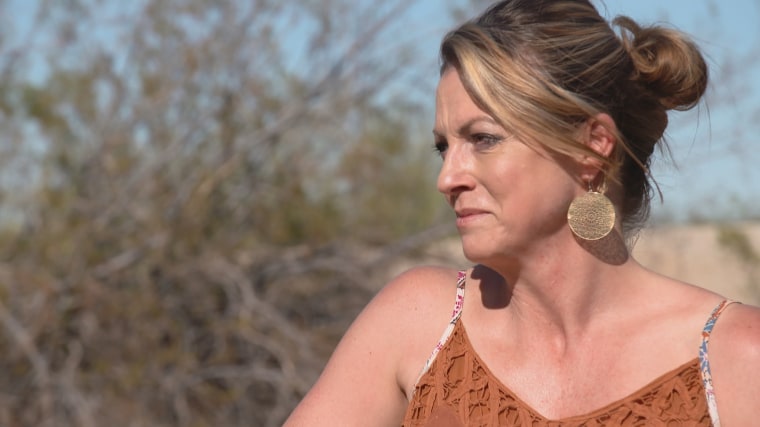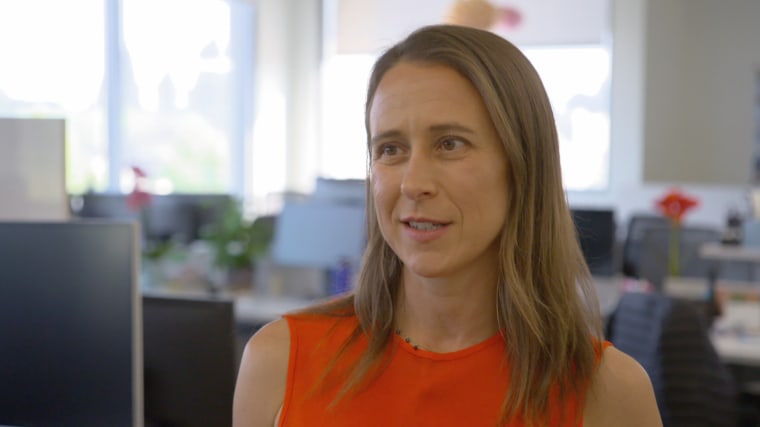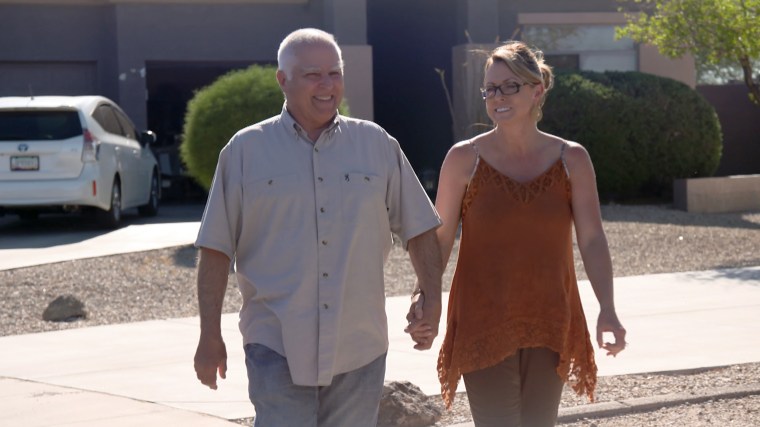Lila D. Lecy was just a few minutes into learning that she had Parkinson's disease when she agreed to send a sample of her DNA to the genetic testing company 23andMe.
Lecy, a former flight attendant based in South Carolina, wasn't suddenly interested in her family's ancestry. She had just been informed that her DNA could be used to fuel research into the incurable disease.
"I had no idea that was possible," said Lecy, whose genetic test results have since been used in 33 Parkinson's studies and counting. "I thought if I could help anybody avoid what I had to go through, I would be more than happy to help."

23andMe is well known for its DNA kits that promise to shed light on a person's ancestral history and potential health risks.
But the Silicon Valley company has quietly evolved into a driving force for medical research, experts say.
By harnessing its massive trove of genetic data, 23andMe has notched more than 110 peer-reviewed publications and launched its own therapeutics lab. Outside researchers and pharmaceutical companies have lined up to collaborate with the firm, drawn by its ocean-sized pool of data derived from the more than 4 million customers who have agreed to let their DNA test results be used in research.
"That provides tremendous opportunities for very novel and innovative research and drug discovery," said Dr. Richard Scheller, the company's chief science officer and head of therapeutics who received the prestigious Albert Lasker Basic Medical Research Award in 2013.
23andMe has contributed to breakthroughs in establishing the genetic links in conditions ranging from chronic pain to cancer, male-pattern baldness to menstrual cramps, according to published studies.
The company's data was put to use in a study published this month that found 124 genetic variants associated with a person's willingness to engage in risky behaviors like drinking, smoking, speeding and having multiple sexual partners.
In another study, 23andMe partnered with drug company Pfizer to identify for the first time a collection of the genetic markers for depression.
"People have tried it before," said Ashley Winslow, a former neuroscientist at Pfizer who is now the senior research director at the University of Pennsylvania's Orphan Disease Center. "We just didn't have big enough data sets."
Pfizer isn't the only drug company to see potential in 23andMe's data.
The pharmaceutical giant GlaxoSmithKline purchased a $300 million stake in the company last July. The goal: use 23andMe's resources to develop new medicines.
But in addition to bringing massive infusions of cash, 23andMe's foray into medical research has drawn increasing scrutiny.
Some privacy and bioethics experts have accused the company of profiting off of customers' genetic material in such a way that could lead to the exposure of a person's most sensitive information.
"They always wanted your spit so they could keep it and analyze it and build their own databases — that's where the money is," said Dr. Arthur Caplan, head of the division of medical ethics at the New York University School of Medicine.
But there's no way to guarantee that the genetic information, once collected, will remain secure, Caplan said.
"There's leaks and hacks all over the place," Caplan said. "So your risk factors could be discovered and then you could find it difficult to get disability insurance or it could affect your job or even your marriage prospects."
The sharing of data with a third-party only increases the risk of a person's health information getting in the wrong hands, the experts said.
"The company they sell to may not have the same rules," Caplan said. "It's a big wild, wild west of sharing information — not really regulated, not much oversight."
A spokeswoman for 23andMe said that customers are given the option to choose whether to participate in research and no identifying information is shared with third-parties. So far, roughly 80 percent of the company's more than 5 million customers have agreed to let their test results be used in research.
The data is presented in an "aggregated, statistical summary format to our collaborators," said spokeswoman Liza Crenshaw.
"For example, summary information may include a statement that '30 percent of males aged 20-35 have reported being diagnosed with X disease and have Y variants/mutations in common,' without providing any data or testing results specific to any individual person."
Crenshaw added that 23andMe collaborates with non-profit foundations and academic institutions, in addition to private corporations, and many of the partnerships offer no financial gain.
In an interview with NBC News, Anne Wojcicki, the company's chief executive, acknowledged the risk of customer data falling into the wrong hands. "There's no such thing as a database that can't be hacked," Wojcicki said. "I think the reality is we do everything we can...We have an incredible number of people really focused on this."

A former Wall Street biotech analyst, Wojcicki co-founded 23andMe in 2006. Her startup, whose name refers to the 23 pairs of chromosomes in humans, got off to a fast start with the help of major investments from Google and several venture capital firms.
But it suffered a massive hit in 2013 when the Food and Drug administration ordered the company to halt sales of its home-test kits. In announcing the crackdown, the FDA said it was "concerned about the public health consequences of inaccurate results."
With its future in jeopardy, 23andMe worked with federal regulators. The effort took four years, culminating in the company becoming the first to get FDA approval to sell home DNA tests that tell people their genetic risk for developing certain diseases.
The FDA gave it the green light to provide risk information for 10 diseases in 2017, including Parkinson's and Alzheimer's. Last March, 23andMe became the first direct-to-consumer test company to get the FDA's nod to report a customer's risk for breast cancer linked to three gene mutations.
Although the FDA has authorized it to screen for a total of 11 diseases, 23andMe currently provides its customers testing for nine.
Wojcicki said she never doubted that the FDA would come around.
"I'm very persistent, and I'm very stubborn," Wojcicki said. "It was never a question. It was just a question of how."
23andMe isn't the only entity sitting on a giant trove of genetic data.
Britain's UK biobank, a study that began in 2006, holds genetic data on more than 500,000 people. The Iceland pharmaceutical company, deCODE genetics, also has a large pool of genetic data and regularly contributes to research.
But no other gene bank, public or private, comes close to matching 23andMe's in size.
The 23andMe data also stands outs for its richness. Because many of the company's research participants fill out an extensive health survey, its pool of information allows DNA experts to establish links between a particular medical condition and a particular gene.
To complete traditional medical studies, researchers must first assemble a group of people with a particular disease or trait, and then search for genetic clues.
"That approach is very cumbersome," said Dr. Eric Topol, a professor of genomics at Scripps Research in California. "It takes time and resources."
But 23andMe can take the reverse approach — selecting the genes to study based on the reported health conditions among its existing data pool.
"The idea of getting millions of people and then picking the ones that have already self-reported a manifested condition, that's a more economical approach," Topol said.
Experts say 23andMe still has a major hurdle to clear as it pursues life-changing treatments.
"The true test will be do they themselves, or in partnership with GlaxoSmithKline, contribute to the discovery of a new drug," said Russ Altman, a professor of bioengineering and genetics at Stanford University, who was on the company's scientific advisory board until 2012.
For Lila D. Lecy, sending her DNA to 23andMe led to more than the satisfaction of having contributed to a better understanding of Parkinson's disease.
Lecy was raised by a single mother who put her into foster care at age 11. For the next several years, Lecy bounced around from different foster homes wondering if she'd ever get to meet her dad.
She eventually moved to France, started a career as a flight attendant, and then decided to return to school to pursue a business degree.
It was around the time of her graduation that the disease began to manifest, robbing Lecy of her strength and mobility. She was officially diagnosed with Parkinson's disease roughly 10 years ago.
In the months after she shipped off her DNA to 23andMe, Lecy logged into her account and was surprised to see a message alerting her to the existence of a first-generation relative.
The message suggested that the woman was Lecy's granddaughter. But that couldn't be right — Lecy had never had children. The pair began exchanging messages and the other woman soon realized there was a more likely scenario — that they were sisters.
Not long after, Lecy received a message from another 23andMe customer: the biological father she had never met.
The man, James Auer, had a brief relationship with Lecy's mother in college and had no idea it resulted in the birth of a child.
"I was numb," Lecy said, referring to the moment she heard from Auer. "Stunned."

Auer, who is married and has three other daughters, drove to South Carolina to meet Lecy and her husband. "It was tears and it was happiness," Auer recalled. "Just talk, talk, talk."
Lecy is now in regular touch with her three half-sisters and four nieces. She sees her father every couple of months.
"I have Parkinson's but I have a family," Lecy said. "And if I had to get one to get the other, I'd do it again."


